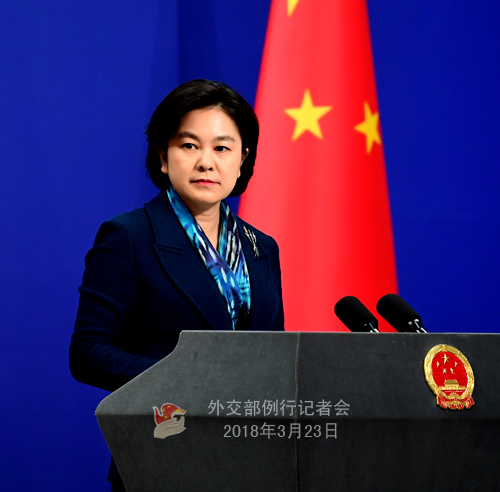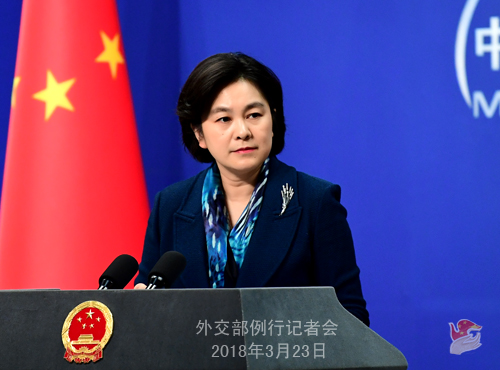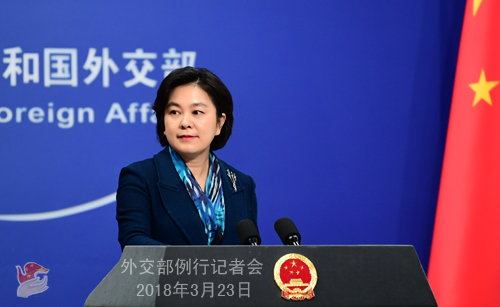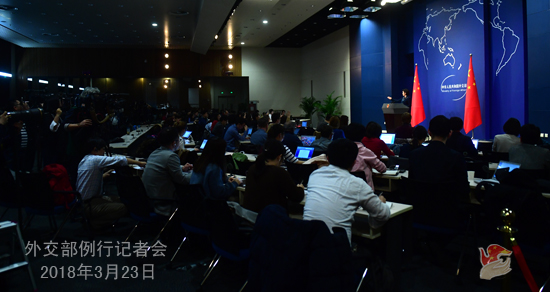| Foreign Ministry Spokesperson Hua Chunying's Regular Press Conference on March 23, 2018 |
| 2018-03-23 23:58 |
|
Q: This morning local time, US President Donald Trump signed a Presidential Memorandum imposing tariffs on goods imported from China. What's your comment? A: The Spokesperson of the Ministry of Commerce has stated China's stance this morning in response to the question you raised. The US has acted in disregard of China's strengthened protection for intellectual property rights, the WTO rules and the call of the business community. This is a typical act of unilateralism and trade protectionism and the Chinese side strongly opposes it. Such action does not serve the interests of China, the US and the world at large and sets a very bad example. Under no circumstances will China sit idly and allow its legitimate rights and interests to be undermined. We are fully prepared to firmly defend our legitimate interests. As to the Section 301 investigation, China has made clear its stance on many occasions. We do not hope to have a trade war with anyone, but we are never afraid of it. We have the confidence and capability to cope with any challenge. We hope the US will make cautious decisions and avoid placing China-US trade relations in danger. Q: A high-level meeting on the Afghan issue will be held on March 27 in Tashkent. Who will represent China at the meeting? What is China's expectation for the meeting? A: China attaches importance to and supports the Tashkent high-level meeting on the Afghan issue hosted by Uzbekistan. Vice Foreign Minister Li Baodong will lead a delegation to the meeting. China supports all efforts that will facilitate peace rebuilding and national reconciliation in Afghanistan, and we will work with the international community and continue to play a constructive role in supporting and helping Afghanistan in realizing peace, stability and development at an early date. Q: According to reports, US President Donald Trump on March 22 signed the Presidential Memorandum related to tariffs on goods from China. White House National Trade Council Director Peter Navarro said that China benefited far more from trade relations with the United States than the reverse, meaning retaliation could be difficult for China. Do you agree with him? A: The Spokesperson of the Ministry of Commerce has stated China's stance this morning in response to President Trump's signing of the Memorandum that directs restrictive measures on China based on the so-called Section 301 investigation. In making his remarks, the relevant American individual you mentioned is a little bit too arrogant. He has apparently miscalculated the situation and underestimated China's resolve and capability to defend its own legitimate rights and interests as well as the price the US has to pay for its recklessness and willfulness. As we stressed repeatedly, the China-US trade ties are mutually beneficial in essence. A case in point is that the imports of low-cost, labor-intensive products from China in large quantities have considerably lowered the consumption cost for American consumers and increased consumer's surplus. This in fact improves consumer's welfare and also helps the US to curb inflation in the larger sense. As such, the US has benefited greatly from it both at the micro and macro level. The US' persistence in advancing the Section 301 investigation and publishing the so-called findings to pick a trade war will undoubtedly undermine the interests of American consumers, enterprises and the financial market directly. As you can see, all the three major US stock indexes have fallen following the signing of the Memorandum, which is a vote of no confidence to relevant wrong policies and moves of the US side by the financial market, and it also sheds light on the international community's concerns over relevant reckless and dangerous policies and actions taken by the US side. Regarding whether China will retaliate, we have stated our position multiple times lately and the message has been got across very clearly. It's impolite not to make a return for what one receives, and we will fight to the end. We hope that the US side will take China's stance seriously, act with ration and caution, and do not be penny wise and pound foolish, which will hurt itself and others as well.
Q: Do China's pledges to swiftly open up the financial markets still stand? Are there any changes in the timeline given impending trade tariffs in the US? A: This year marks the 40th anniversary of reform and opening-up. Our leaders have made it clear on various occasions that China has opened up its door with reform and opening-up efforts and that door will not be closed. We will continue to move forward with the reform and opening-up cause in accordance with our development needs and tempo. We hope that the US could rationally and objectively view China's efforts and achievements in reform and opening-up, including in the opening-up of financial markets. Q: First of all, in making the decision on the 301 case, President Trump also said that he still considers President Xi Jinping as a friend. Does the Chinese government still consider President Trump a friend of China? The second question is about President Trump's announcement that his new national security adviser will be John Bolton who made some very strong comments about US policy on China and about the DPRK as well, including among other things he suggested that the one-China policy should be rethought. Does the Foreign Ministry have any comment on his appointment? A: Regarding your first question, head-of-state diplomacy is of strategic importance in guiding the development of bilateral ties. There is a consensus between China and the US to resolve disputes through dialogue and consultation. We hope that the two sides could honor such consensus, stay on the track of cooperation and handle differences based on mutual respect and win-win outcomes. As for the personnel change in the US, which is their domestic affair, it is not suitable for us to comment on that. However, one thing is clear. Whoever takes the post will not affect the importance of China-US relations. China and the US respecting each other, focusing on cooperation, properly handling differences, and working for win-win results serves the common interest of the two sides and meets the expectation of the international community. We hope that the US and China could meet each other halfway so that China-US relations could continue to develop with a sound and steady momentum. China and the US need to shoulder the responsibilities that come with the status of the world's top two economies and permanent members of the UN Security Council, and jointly contribute to stability and prosperity of the whole world. As for the one-China policy, I believe our position is already very clear. The US side knows it very well. Q: On March 22, President Abdulla Yameen of the Maldives announced to lift the state of emergency. What is your comment? A: The state of emergency is lifted and social order is returned to the Maldives. China welcomes this development. We believe that the Maldivian government and parties have the wisdom and capacity needed to properly resolve disputes through dialogue and consultation and jointly maintain political stability and social harmony in the Maldives. Q: Japanese Foreign Minister Kono Taro is visiting Hong Kong tomorrow. What is your expectation for that? Will that affect China-Japan relations? A: According to the Basic Law of the Hong Kong Special Administrative Region of the People's Republic of China, the Hong Kong SAR may maintain and develop economic, trade and financial relations with their counterparts in foreign countries and regions and with relevant international organizations. They may, as required, use the name "Hong Kong, China" in the relevant activities. The Central People's Government welcomes exchanges and cooperation between Hong Kong and other countries in the fields like trade, culture and tourism. But China's position is clear. Hong Kong affairs are China's domestic affairs, and we oppose any external interference in Hong Kong affairs. We hope that Foreign Minister Kono's visit to Hong Kong will help enhance exchanges and cooperation between Japan and Hong Kong in these fields. Q: The US has decided to impose restrictive measures on imported Chinese goods. Meanwhile, the White House said that China acquired sensitive information, including business secrets from the US side by participating in and supporting cyber attacks on US companies. China also forced the US companies to make large-scale technology transfer by such means as restricting their intellectual property licensing. What is your comment? A: I have seen relevant reports. The US side must understand that in terms of innovations and intellectual property rights, it is indeed a strong power, but that does not make it a "monopoly" in these fields. I mentioned the WIPO's annual World Intellectual Property Indicators report the other day. The report showed that China's State Intellectual Property Office (SIPO) received the highest number of patent applications in 2016, a record total of 1.3 million, exceeding the combined total of the US, Japan, the ROK and the EU. It also pointed out that China is on its way to becoming the world leader in international patent filings within three years, as we resolutely implement our innovation-driven development strategy. Everyone knows that China already leads the world in the fields like high-speed trains, quantum communications and mobile payment. One thing we need to straighten out with the US is that China's innovation achievements are earned by the wisdom and sweat of 1.3 billion Chinese people, not by stealing and not by robbing anyone. Such achievements may make the US feel worried, but as the largest economy in the world, the US is supposed to be above making groundless accusations and blowing things out of proportion. We also find that unacceptable. Q: According to Australian and Chinese media reports, there is now a worsening tendency in China-Australia relations due to such reports of China's "political infiltration" in Australia. Many Chinese students in Australia said now it's much more difficult for them to get the visa and they have to wait longer for that. Some Chinese media even advise them not to go to Australia for study. Is China aware of such situation? What's your reaction to this? A: There have been quite some discussions about the so-called "Chinese influence" and "infiltration" in Australia recently, where ideas have clashed fairly fiercely. Such question comes down to the way some Australians view China's development and the issue of whether China and Australia could seek mutual benefit and win-win cooperation with mutual respect. It also shows that certain people in Australia have failed to discard the zero-sum mentality and are unable to look at and handle its relations with China in a correct way. As to the difficulties some Chinese students may have encountered when trying to get their Australian visa as you mentioned, the Chinese educational authorities have been aware of relevant situation. Education is an important area for exchange and cooperation between China and Australia, and we hope Australia will create enabling atmosphere and conditions for exchange and cooperation in the field of education among others.
Q: I have a question about how would fighting a trade war with the US impact China's domestic agenda to lessen financial risks, deal with pollution and alleviate poverty? A: You can tell from the 19th CPC Congress and the Two Sessions just concluded that the Chinese government has clearly identified its goal for development going forward. We will continue to unswervingly pursue the set goal and path and no external forces or incidents could disturb our pace. Q: Are you worried about the impact that Bolton's taking office might have on the Iran nuclear deal because he had spoken very negatively about it in the past? A: As we said before, the Joint Comprehensive Plan of Action (JCPOA) is an important outcome of multilateralism and an exemplar of resolving international hotspot security issue through political and diplomatic means, and it is conducive to upholding the international non-proliferation regime. The JCPOA is also an international agreement approved by the UN Security Council, which we hope all parties could continue to follow through on seriously. Q: Are communication and consultation still going on between China and the US on the issues regarding trade tariffs? A: In fact, the channel of communication between China and the US regarding trade issues remains open as always. The two sides have maintained communication at various levels on trade issues, including on the trade frictions you are all closely following. In disregard of the mutually beneficial and win-win nature of the trade ties and the consensus on properly handling differences through dialogue and negotiation between the two countries and ignoring the call for ration from various parties, the US has persisted in going ahead with the Section 301 investigation and published the so-called findings, which is a typical act of unilateral trade protectionism. We are strongly disappointed and firmly opposed to that. As we said many times, as the world's top two economies, if the two sides respect each other, seek mutual benefit and reciprocity, focus on cooperation and properly handle differences, and ensure the sound and steady development of our economic and trade relations, this will be conducive to upholding global economic stability and normal international trade order, which is also the shared aspiration of the international community. With regard to this issue, acting in an arbitrary and reckless manner is both wrong and irresponsible. Still, we hope that all parties can calm down and conduct constructive dialogue and consultation to properly resolve relevant issues, which is in the interests of both sides. Having that said, if the US is bent on having one's own way, China will fight to the end. We will take all necessary measures to safeguard our legitimate rights and interests. Eventually, the American consumers and enterprises will bear the brunt of such actions. We hope that NBC along with other American media can get across the voice of justice and ration to the American people so that your government will be prompted to make rational decisions and act with caution. Q: The Chinese side previously warned the US that it must step back from the brink with regard to the trade war. I wonder if you could give us a time frame for that and at what point must the US step back from the brink? What retaliatory measures will China take? A: We always hold the door to dialogue and consultation open, because we believe that a trade war between the world top two economies does not serve the interests of either side and will undermine world economic stability. China and the US should properly deal with relevant disputes while bearing in mind that we must be responsible for the two peoples and the whole world. We hope that the US side could come to reason and work out a win-win solution for the current situation together with China through negotiation and consultation. However, if the US is bent on going down its current path, we are also fully prepared and will take all necessary measures to defend our legitimate interests. Q: The Vietnamese oil company PetroVietnam has asked the Repsol, the Spanish energy company, to stop one of its projects in the South China Sea. Did China put any pressure either on the Vietnamese side or on Repsol directly? A: I don't know where you got this information from. I would like to stress that China's position on the relevant South China Sea issue remains consistent and unequivocal. The situation in the South China Sea has gradually cooled down and continued to take on a positive trend now. We hope to work with relevant parties to uphold the hard-won sound situation there and make positive contributions to regional peace and stability.
|
 |
|



